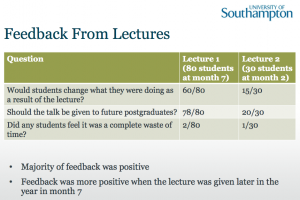DataPool expands on student RDM training approaches at IDCC13, Amsterdam
Two presentations from the University of Southampton at the 8th International Digital Curation Conference (#IDCC13) set out its approach to providing training for research data management for postgraduates. Taking a broad approach, DataPool gave a poster on working with PhD and Early Career Researchers, described as featuring “examples of essential building blocks coming out of researcher-focussed work”. In the main conference a team from the Faculty of Engineering and the Environment presented a paper jointly with DataPool on a booklet “Introducing Research Data” they have produced, and included some startling findings from initial training sessions with students. Below Mark Scott from that team introduces the booklet, and we reproduce the live Twitter record of the presentation, which highlights the main points from the talk identified by the Twitter reporters, particularly those findings on student responses.
We recently presented some of our postgraduate training material at the IDCC conference in Amsterdam. With so much data out there, and much of today’s research relying on large scale data sets, it is important to educate researchers about their data – and its value – early.
Our approach was two-fold: a lecture to introduce research data management to first year postgraduates, and a booklet introducing the area. The talk concentrated mainly on the booklet we produced.
The booklet had three sections: an introduction to types of research data, some case studies showing real-world examples of the types of data in use, and some best practices. For the case studies, we looked at five researchers’ work from medicine, materials engineering, aerodynamics, chemistry, and archaeology, and tried to show the similarities and differences between the data types they produce using the categories from the first section.
The concepts in the booklet have been presented twice as a training lecture in the Faculty of Engineering and the Environment, and the material has also been used in the WebScience Doctoral Training Centre. The feedback from students suggest that being made to think about these issues is necessary and useful, and engaging them at this stage helps cultivate good practices.
Mark Scott
Below is the Twitter record of Mark’s talk on 16 January 2013, from #idcc13, in the chronological sequence of posting.
Meik Poschen @MeikPoschen Next up is Mark Scott, University of Southampton on ‘Research Data Management Education for Future Curators’ #idcc13
Marieke Guy @mariekeguy #idcc13 Mark Scott from Uni of Southampton – post graduate training, created a magazine style booklet for all first year students
Archive Training @archivetraining Southampton University give magazine style RDM booklet to 1st year PG students. #IDCC13
@MeikPoschen Booklet to introduce RD to first year students with 3 sections: 1) five ways to think about RD, 2) case studies, 3) DM best practice#idcc13
Jez Cope @jezcope Good, thorough description of the Southampton approach to RDM education from Mark Scott. #idcc13
@mariekeguy #idcc13 Uni of Southampton – 5 ways to think about data: creation, forms of research, electronic rep, size/structure, data lifcycle
Gail Steinhart @gailst Southampton’s RDM guide for first year post-graduate students: http://ow.ly/1RbLND (PDF) #idcc13
Full link added: http://eprints.soton.ac.uk/338816/1.hasCoversheetVersion/studentdata.pdf
@jezcope I want to see Southampton’s RDM booklet, which includes ways to think about data, case studies and best practices. #idcc13
SMacdee @SMacdee #idcc13 – mark scott (U of Soton) RDM education booklet for Postgrads: 5 ways to think about research data; case studies; best practices
@MeikPoschen Booklet: 2) case studies giving an overview on various disciplinary examples, covering Genetics, Materials Engineering, Archaeology#idcc13
Mariette van Selm @mvanselm +1 RT @jezcope: I want to see Southampton’s RDM booklet, which includes ways to think about data, case studies and best practices.#idcc13
Odile Hologne @Holo_08 Five Ways to Think About Research Data http://bit.ly/XDahjb Mark Scott course for students #idcc13
Corrected link: http://eprints.soton.ac.uk/338816/2/StudentDataIntroduction.pptx
@mvanselm Mark Scott (Uni of Southampton) on RDM education: “When you start scaring students, they start paying attention” #idcc13 🙂
@mariekeguy #idcc13 Southampton noted that students happier with RDM lecture when delivered later in year – had real data experience at that stage
@jezcope Feedback for Soton’s RDM lecture was better when it was delivered later in the year. PGRs need to have some data experience first?#idcc13
@archivetraining Southampton’s feedback: RDM lecture was more positive when given in month 7 – when data collection was underway. The power of fear! #IDCC13
@MeikPoschen Booklet now part of University of Southampton’s wider (10 year) training etc. scheme #idcc13
@archivetraining Lots of RDM guides for lots of different audiences being shown-off at#IDCC13. Here’s ours [in German – English coming] http://bit.ly/TqDrTJ
For a view of wider coverage and activities with a research data training theme at #IDCC13, we return to our colleagues at @archivetraining:
“The impression I took from this bundle of presentations (mostly funded by the excellent JISC Managing Research Data programme) was that projects doing data management training or support have to effectively design a campaign strategy, as one would for an election. Digital curation is akin to a valence issue – we all like sharable, long-term secure data – but how we get there needs to be thought about.” More
Or for more views on #IDCC13 as a whole, see this collection of post-conference blog posts.

